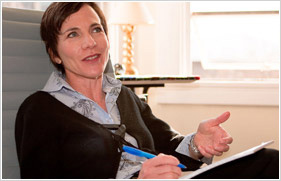Solutions

Instead of focusing on past events, Cognitive Behavioral Therapy addresses the existing condition. However, because anxiety disorders are often genetically linked, Dr. Walker explores the family history to determine if hereditary factors are involved. Patients are educated about their condition and predisposition and learn what particular CBT treatment modalities are best suited to treat the problem. Patients, and parents of patients, are taught how to use hands-on, proven tools to combat their symptoms.
Unlike other treatment options, CBT treatment goals are not subjective or vague. The objectives established during CBT are specific and observable. Patients, together with Dr. Walker establishes daily, detailed therapy homework, so that treatment continues throughout the week, rather than only during the therapy session.
Typical Treatment Plan
Sessions 1, 2, 3: Assessment
- Identify troubling symptoms that you want help with
- Identify the problem/disorder to determine the treatment plan that is appropriate
Psycho-education:
- Educate the patient about their problem/disorder
- Explain likely treatment interventions that will be most effective
- Provide bibliotherapy resources if desired
Get Feedback from patient:
- Does this sound like something you want to do?
- Discuss how treatment is collaborative and there is flexibility in the pace
of treatment. - If motivation is limited, possibly utilize Motivational Interviewing to increase motivation to engage in treatment. This may take a few extra sessions.
Treatment Planning:
- Develop detailed plan for helping patient get relief from symptoms and presenting problems.
- Set concrete treatment goals and institute plan to gauge progress throughout treatment.
Session 4: Skill Building:
- Identify skills the individual needs to participate in the treatment plan.
- Begin to teach and practice them in session(monitoring, labeling, increasing awareness of automatic thoughts, etc). This continues throughout sessions as needed.
Session 5-15: Facilitate elements of the treatment plan:
- Motivational Interviewing; as needed
- Exposure exercises (Invivo, imaginal, flooding)
- Reduce/eliminate rituals
- Exposure with Response Prevention for OCD
- Cognitive restructuring
- Behavioral experiments
- Reduce safety behaviors
- Reduce avoidance behaviors
- Facilitate weekly therapy homework
- Continually assess progress toward treatment goals
- Continue skill building , psycho education, etc as needed
Session 15: Relapse prevention Plan
- Exposure practice list
- Behavioral practice list for maintenance of gains
- Identify potential problems ahead of time and make plan of action if trouble arises
Session 16: reduce therapy meetings while patient engages in relapse prevention plan
Finish Therapy work
- Tune-ups sometimes are useful and tend to be infrequent.
Solutions for Parents
Unfortunately, parents often inadvertently contribute to a child’s anxiety issues. Because anxiety problems naturally elicit behaviors from parents that are counterproductive to recovery, education is vital. Parents should not feel guilty about their role; instead parents can help their children achieve recovery by implementing the tools of Cognitive Behavioral Therapy. In fact, Dr. Walker often works exclusively with the parents when treating a young child. By adjusting the parents’ behaviors and responses, a treatment plan for the child can be realized that will effectively address the child’s symptoms.
Solutions for Families
Anxiety disorders affect the entire family. Dr. Walker educates spouses, partners, siblings and parents about the particular problem and the roles they play in reinforcing their loved one’s fears. Through the education process, the family members who may have previously felt helpless, feel empowered. They learn concrete steps that they can take to lead their loved one to recovery.

